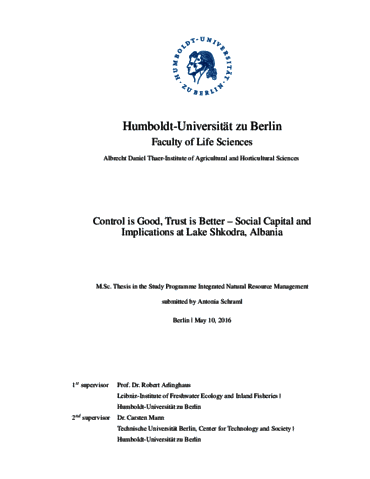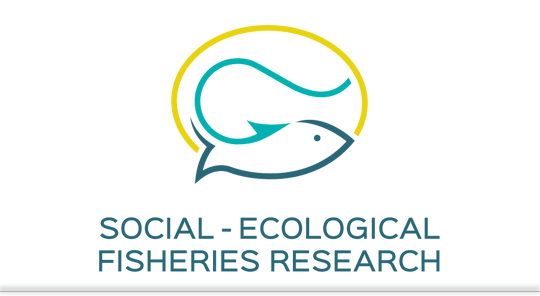Complex social-ecological systems are characterized by a diversity of interactions and feedbacks among the elements of the ecological and the social dimension. Inland fisheries represent such complex systems, where the reconciliation of interests between local resource use and protection is a key aspect of sustainability. In order to account for the uncertainties and non-linear feedbacks that challenge the governance of social-ecological systems, flexible and adaptive co-management systems provide a valuable approach. In these management regimes, the devolution of responsibilities and the participation of local resource users is of pivotal role for achieving social, economic and ecological sustainability targets. The alignment of the social and the ecological dimension is associated with some degree of collective management or cooperation among individuals. The configuration of social networks, relations of trust and the rules-in-use – attributes which are included in the concept of social capital – shape the social dimension in that they influence the actors’ ability to cooperate, provide incentives and motivations for compliance or non-compliance with regulations and facilitate knowledge exchange. At Lake Shkodra, a biodiversity hotspot in Albania, information about the social dimension of the fishery co-management are scarce and particularly lack an understanding of implications arising through the post-socialist context of the country. This knowledge gap was addressed with a qualitative case study approach. 36 semi-structured interviews with actors at the local, regional and national level across actor groups, e.g. fishermen, state authorities and environmental organizations, were conducted during fieldwork in August and September 2015. The use of the Social-ecological Systems framework facilitated the structured analysis of three micro-level outcomes of fishery: levels of compliance, the likelihood of self-organization and social fit. With the exception of the fishing community in Zogaj, limited networks of trust among actors and weak bonding, bridging and linking ties were identified. Effective co-management is further influenced by corruption, levels of participation and the perceived legitimacy and the experiences of actors from communist times. The study highlighted the tight linkages and feedbacks among the elements of social capital and the outcomes associated with the social dimension of fishery. Investing in the establishment of trustful relations through communication and stakeholder participation could leverage adaptive capacities of the co-management and pave the way for long-term sustainability.
Control is good, trust is better – social capital and implications at Lake Shkodra, Albania
MSc thesis

Schraml, A. (2016). Control is good, trust is better – social capital and implications at Lake Shkodra, Albania. Master Thesis, Humboldt-Universität zu Berlin / Leibniz-Institut für Gewässerökologie und Binnenfischerei (IGB) in Berlin
Published
: 2016
Appeared in
: Master Thesis, Humboldt-Universität zu Berlin / Leibniz-Institut für Gewässerökologie und Binnenfischerei (IGB) in Berlin
